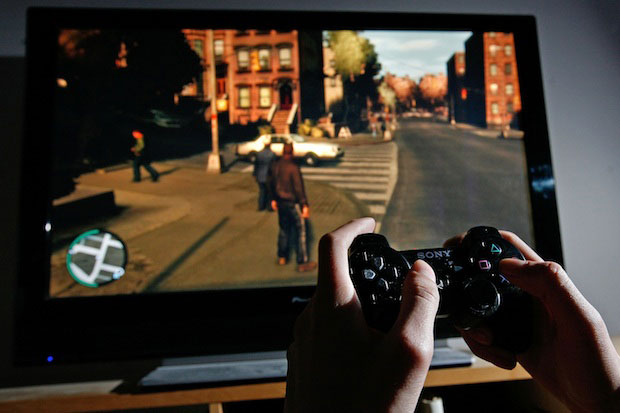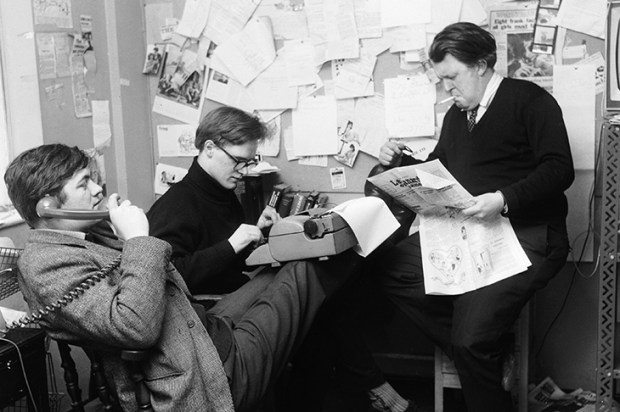The last — and only — time I had sex with a whore she was so impressed by my performance that she begged me to do it all over again. I thank the drugs. Before popping out in my stolen car for my rendezvous with my skanky ho, I had smoked a couple of fat blunts which I’d found ready prepared for me by my bitch next to my beer fridge and it put me in just the right mood.
But none of this was ‘real’. I was playing the video game Grand Theft Auto V (GTAV) and enjoying the transgressive thrills of living the life of a young black hoodlum in inner-city America. It’s an experience I can highly recommend, not just because you get to steal flash cars, deal drugs, drive the wrong way down one-way streets, change into any number of hoodies and cool sneakers, and shoot people — but also because as you’re doing it you’re sticking a defiant finger up to the Man. Or more specifically, to the stifling worthiness of our modern culture whose default position on innocent pleasures like this is to condemn them for their outrageous sexism, racism, misogyny and violence.
And yes, maybe games like GTAV are all those things, but it doesn’t seem to do them much harm at the box office. Au contraire: on its release last year GTAV became the most successful entertainment product in history, earning $1 billion within its first three days of release. No doubt the superb gameplay was a draw. As were the groovy soundtrack and state-of-the-art graphics. But the clincher, I suspect, for a lot of its young male fans, was the sheer joyous escapism into a universe where you can still act out your most politically incorrect fantasies without some professional victimhood group like 350.org or Everyday Sexism demanding you be carted off in the Outrage Bus for compulsory re-education.
You only have to consider briefly what has happened to the various other branches of the culture and entertainment industry to appreciate how rare this is. We live in a world where basketball club owners and football managers are expected to converse, even in private, like Harriet Harman at an equality seminar; where Hollywood scarcely dare cast an African-American in any role other than police chief, supreme court judge or the voice of God; where the crazed terrorists in TV dramas are invariably rogue Mossad agents or crazed Christians; where you can mock any religion you like on stage, provided it’s not the Religion of Peace. Gaming is the last bastion, the Helm’s Deep of freedom of expression.
Some say the reason that the computer industry managed to get so rich is that it grew faster than government’s ability to constrain and regulate it — and something similar probably explains the untrammelled rise of the games industry. You’re probably not aware — most people aren’t — that it is now bigger than Hollywood, worth $80 billion a year. It rose without anyone noticing, because gaming has long been unfairly stigmatised as an activity for malodorous bedsit-dwellers rather than cultural trendsetters. And it grew to be so enormous by doing what other branches of the entertainment industry have largely forgotten: not by giving punters what they ought to like, but what they actually want.
I tell you all this by way of background to a scandal which, over the last few weeks, has riven the world of joysticks, consoles and zombie Nazis. It is called, inevitably, Gamergate. For the full story I recommend you Google ‘GamerGate Milo Yiannopoulos’. He helped break it and has been following the details closely. Some of them are quite insalubrious, especially the one about the female games designer who allegedly slept with a number of journalists and games industry figures, allegedly to help promote a game she had designed.
More broadly, the scandal is about militant feminism and left-liberal entryism. Pretty much every games journal in the industry, it seems, is now in thrall to an achingly right-on cabal of writers, editors and bloggers who collude, via a secret mailing list, on how to shape the news agenda for their political purposes. This has led to a slew of stories about sexist bias and misogyny, fuelled by a vocal group of female wannabe games designers playing the professional victim card in order to advance their cause and their careers.
So far, so nothing all that scandalous, you might think. But this is what makes the story oddly fascinating. In any other industry but gaming, the antics I’ve described above have become routine: no one is remotely surprised any more, for example, when climate scientists and green activists collude with wildlife charities, politicians and environmental correspondents to put across the ‘correct’ message. As for the feminazis, they’re everywhere aren’t they: all over Twitter and Mums-net and Change.org like a dose of thrush, brandishing like badges of honour the supposed rape threats and death threats from the men they’ve so assiduously goaded. Why should the world of gaming be immune?
‘Because we just should,’ has been the response of the gaming community. They’ve simply looked at what’s happened to the rest of the world — the creeping politicisation of absolutely everything by the cultural Marxists — and decided they want their cloistered play realm to remain sacrosanct. ‘They don’t want their universe invaded by social justice warriors and they’re fighting back as only gamers know how,’ says Yiannopoulos.
Got something to add? Join the discussion and comment below.
Get 10 issues for just $10
Subscribe to The Spectator Australia today for the next 10 magazine issues, plus full online access, for just $10.
You might disagree with half of it, but you’ll enjoy reading all of it. Try your first month for free, then just $2 a week for the remainder of your first year.















Comments
Don't miss out
Join the conversation with other Spectator Australia readers. Subscribe to leave a comment.
SUBSCRIBEAlready a subscriber? Log in